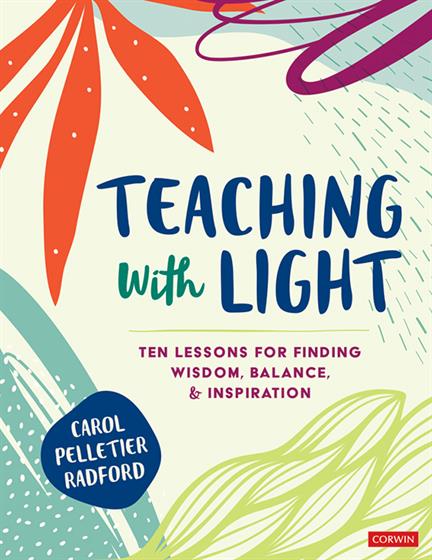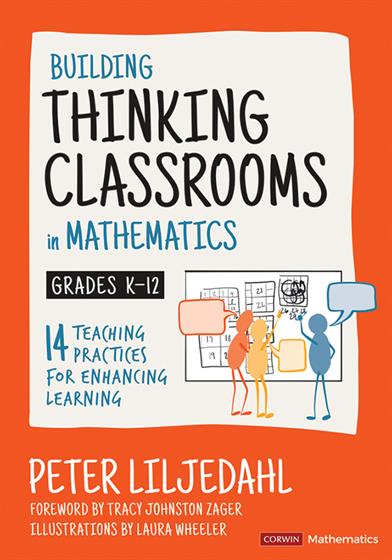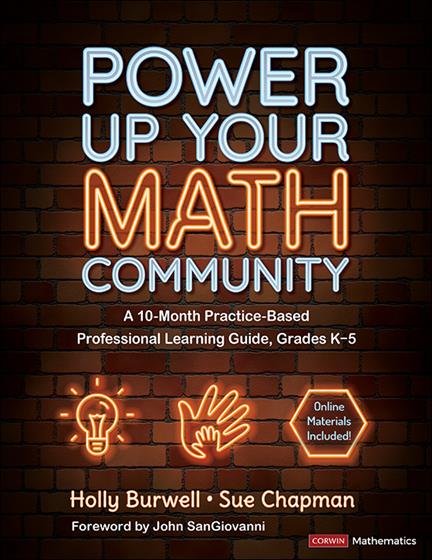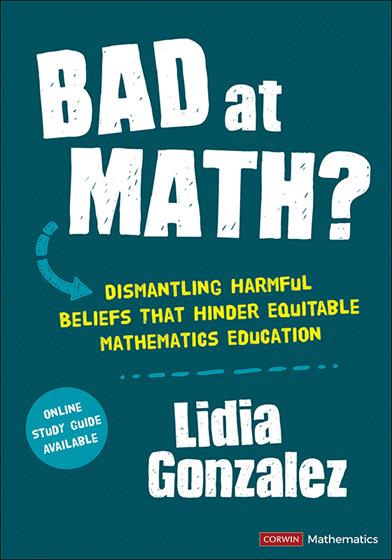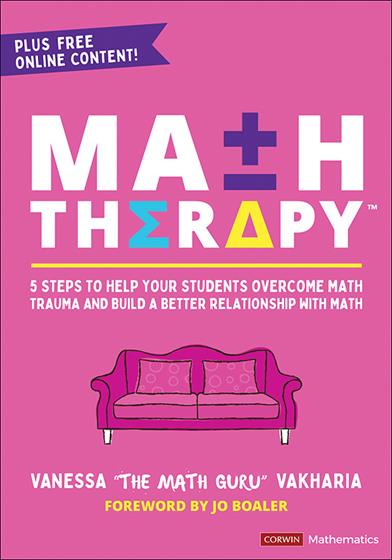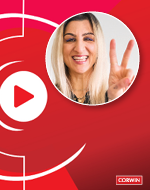
Bloom Where You're Planted
Guest(s): Vanessa Vakharia and Tami DuFault-Toomb
Date: 09/18/2024
Run time: 40:33
Season 3, Episode 2
In Episode 2, hear from Vanessa Vakharia & Tami Dufault-Toomb in "Bloom Where You're Planted" as they share their experiences, practical advice, and ways to stay inspired!
Vanessa is author of Math Therapy™ (Corwin, 2024) and host of the podcast, Math Therapy.
Bonus Track: Carol’s Bloom Where You're Planted story from Teaching With Light
The Year After the School Burned Down
Bonus Youtube: Bloom Where You're Planted hand mudra
Listen, review and subscribe on: Apple, Spotify, YouTube,
Episode Audio
[00:00:03.10] NARRATOR: Welcome to Corwin's Teacher to Teacher podcast with
host Carol Pelletier Radford. Carol is an experienced classroom teacher and
university educator, founder of Mentoringandaction.com And author of four
bestselling professional books for teachers.
[00:00:17.24] She believes the best form of professional learning happens
when teachers engage in authentic conversations and share their wisdom. In
every episode, Carol and her guests, share stories about pivotal moments in
their careers, successful classroom strategies, and personal actions they take
to minimize stress and stay healthy.
[00:00:34.88] The Teacher to Teacher podcast is a place to engage in
authentic conversation and reflection with experienced educators. We hope these
conversations will energize you, keep you inspired, and remind you why you
chose to become a teacher.
[00:00:47.21] [CALM MUSIC]
[00:00:49.17] CAROL PELLETIER RADFORD: Welcome to season three of the
Teacher to Teacher podcast. I am your host, Carol Pelletier Radford. I'm so
happy to be part of the conversation with two very experienced educators today.
[00:01:03.33] The theme for season three of Teacher to Teacher is based on
the book that I wrote titled, Teaching with light, 10 lessons for finding
wisdom, balance and inspiration. And each of the 10 episodes for this season
mirror the 10 lessons in the book. So, today's lesson is lesson two, bloom,
where you're planted.
[00:01:28.84] And I'd like to welcome our two guests, Vanessa and Tammy. So,
let's begin by having you each introduce yourselves to our listening audience.
So, Vanessa, who are you?
[00:01:42.75] VANESSA VAKHARIA: Oh, my god!
[00:01:43.53] CAROL PELLETIER RADFORD: What are you doing? What's your
current role in education? And tell us, your teaching experience.
[00:01:53.14] VANESSA VAKHARIA: Hi, my name is Vanessa and I am a math
therapist.
[00:01:57.49] CAROL PELLETIER RADFORD: I love that.
[00:01:58.33] [LAUGH]
[00:01:59.86] VANESSA VAKHARIA: Education is helping teachers heal their own
math trauma and helping them help their students heal their math trauma. So, I
have a book coming out with Corwin. It's called, Math Therapy. I have a podcast
called Math Therapy, where I speak to adults about their history with math
trauma.
[00:02:18.98] And I have a tutoring center in Toronto where we tutor about
1000 students a year and help them work through their negative relationships
with math, in order to heal one on one.
[00:02:30.22] CAROL PELLETIER RADFORD: I love that since I am one of those
math students that had a lot of trauma around math all through school, and I
wish that my teachers had this book and my own training for. It just brings it
right back like sweaty palms and the whole thing of being the student that
couldn't do math. That I was. I was not that student.
[00:02:56.94] So did you teach, Vanessa? What's your teaching background?
[00:03:00.30] VANESSA VAKHARIA: I taught in the grade 10 high school
classroom for about two months of my life. I very quickly realized that wasn't
the place. Since we're talking about blooming where we're planted, that was not
the place for me to bloom. I really don't like red tape. I don't like being
able to not do things that I feel are aligned and authentically right for the
student.
[00:03:22.12] Just because there are administrators in place or authority or
anything that will let that happen. And I realized very quickly that my role
was to work one on one with students in order to really cultivate a healing
relationship with math, so.
[00:03:35.16] CAROL PELLETIER RADFORD: I'm so glad you found out early
enough. And I'm sad in some ways because we don't want to lose teachers that
are so energetic like you. But I love what you said like find. You stay in
education. You didn't leave. You found that place to bloom. For you to bloom.
And we'll talk more about that.
[00:03:55.57] Tammy, please introduce yourself to our listeners and what
your current role.
[00:04:01.78] TAMI DUFAULT-TOOMB: Thanks, Carol. I'm Tammy Dufault-Toomb. I
work out in Oregon at a regional office, the Linn Benton, Lincoln, ESD and I
co-lead a new teacher mentor program, and my colleague, Cindy Jordan and I work
together to support the mentors in our regions. We have 12 districts and this
is our third year.
[00:04:27.05] We started the program from scratch with the help of Carol, by
the way,
[00:04:31.93] CAROL PELLETIER RADFORD: Thank you for that acknowledgment and
shout out. I love working with you. And did you teach? What was your teaching
experience?
[00:04:39.02] TAMI DUFAULT-TOOMB: I did. I taught for 26 years at the
elementary level, grades K through five. And I've been really fortunate in my
career to get to do a lot of different things, which I think led to the
longevity.
[00:04:53.65] This is my 40th year coming up, and so, I taught for 26 years
and then, I moved into a literacy specialist role and became a mentor and an
instructional coach and now into my new role.
[00:05:08.55] CAROL PELLETIER RADFORD: Right, the new role. So, you both
bring. So, this podcast is Teacher to Teacher and I love bringing two teachers
together who have very different experiences. But the goal of this conversation
is to share our wisdom and have our listeners listen to see what fits for them
and what they can take away that they can use.
[00:05:29.50] But I always like to start with a story, and the lesson is
bloom where you're planted. And I asked listeners like, what does that mean to
you. I know what it means to me. I wrote about it in teaching with light. But,
Vanessa, share what that means to you. Bloom where you're planted.
[00:05:48.75] And a story from your past or present that has us understand
what you learned or pivotal moment that can help us understand how you've grown
over the years.
[00:06:04.20] VANESSA VAKHARIA: I think when you say bloom where you're
planted, it's reminding me of a quote I heard the other day, which was, you
can't influence. You can't control outcomes, but you can influence them. And I
think in a lot of situations, we can't necessarily leave our environment. We
can't control our environment.
[00:06:25.32] I will tell the story in a second about me as a student. I was
in school. I couldn't exactly leave school. But as we as we grow up and as we
become an adult and we get to know ourselves better and we learn what our
coping tools are and what resources are available to us.
[00:06:40.43] It really helps us navigate situations in which we can't
necessarily change the external circumstances, but instead we can use our own
strength and resilience to literally bloom in a circumstance that might seem
adverse at the time, but ends up being so healing for us, because what
challenges us often is what leads to real growth and change.
[00:06:59.34] So, that's kind of what I think of. And I guess the story I
always default to is when I was a student in grade 11, I hated math. And I just
wanted to be a rock star. And marry Keanu Reeves, which I still, as everyone
knows.
[00:07:15.69] CAROL PELLETIER RADFORD: Yes.
[00:07:16.83] VANESSA VAKHARIA: Still my goal to this day, I'm just waiting
for that phone call. And I was always told that I wasn't a math person. People
who looked like me didn't do math. People who talked like me didn't do math. No
one really tried to support me. I went to a very academic high school and my
teachers were just kind of like waiting for me to get out of their classrooms.
[00:07:35.05] So, I failed once. I failed twice. And then I did it. I did
grade 11 math in summer school the third time, and I ended up with a 57. And my
parents were like, oh, my god, you're going to fail out of school and I don't
know what's going to happen to you. So, they sent me to what was called an
alternative school back then, and it was in an office building with 100 kids.
[00:07:56.23] And we took elevators to class, as I said, and we call
teachers by their first names. And it was such a different vibe because we all.
We had nothing in common except that all of us were labeled misfits and no one
believed in us.
[00:08:09.07] So, it was a really cool experience because we were in this
building where the only adults in like many of our lives who had ever believed
in us were the teachers in that school. They were like. They were kind of like,
it's not that you can't learn and it's not that you're not smart enough for
like the traditional way of learning.
[00:08:27.46] It's that you need and deserve a different approach to
learning. So, I walked into my grade 12 math class and I said to my teacher,
Eva, who I'm still best friends with to this day, I said, you're going to have
a lot of trouble with me. I'm not a math person. And she was like, what? And I
was like, I'm not a math person.
[00:08:43.60] And she just looked at me and said the words that changed my
life, which were that's not a thing. And.
[00:08:49.89] CAROL PELLETIER RADFORD: Love it.
[00:08:50.88] VANESSA VAKHARIA: Then she told me to stop disrupting the
class and to sit down. And I ended up I ended up with a 98 in grade 12 math.
[00:08:57.34] CAROL PELLETIER RADFORD: I love it!
[00:08:58.09] VANESSA VAKHARIA: Yeah, and it was just. That's obviously way
before I went to teachers college. But I think in that moment, I mean, that
changed my entire.
[00:09:06.39] CAROL PELLETIER RADFORD: That's a pivotal moment for that
teacher, actually. Saying that to you and believing it and not just saying and
believing it. And that's what I hear in you that changed it. And now, look at
you. As I read your description, the Lady Gaga of math.
[00:09:25.67] So, this math therapy and this book is the exact opposite of
how you felt when you were a student. So, congratulations! And yay! Everybody's
like, uh, I want to have that experience. Tammy, so, what is bloom where you're
planted? When you heard that, what does that mean to you and how does that
apply to you. What's going on with you, your story.
[00:09:52.97] TAMI DUFAULT-TOOMB: Well, first of all, Vanessa, I am
completely inspired by your story. I want to believe that in the 26 years in
the classroom that I did that for my students, that they felt that way and felt
that they belonged and that they were connected and that they had the ability
that I believed in them to be able to do what you were talking about.
[00:10:20.26] As I mentioned earlier, I have done a lot of things in
education, and I think one of the biggest moves I made was three years ago
moving from a what would be the traditional school district setting into a
regional setting. And it was like going to a foreign country. I had to learn a
new language. I had to learn a new structure and system and people.
[00:10:44.96] And I realized, you know what? You've done this so many times,
Tammy. It doesn't matter if you're in a new school, you're in a new district.
Wherever you go. For me to bloom, I have to find the people who share the same
passion and purpose that I do, because those are the people that keep me going
when things are hard.
[00:11:05.78] And one of those people was Carol, coincidentally, because I
was starting a mentoring program from scratch. And so, I reached out to
everybody and anybody. I always go in with the premise that I have something to
learn, and I look for those people who have done the work and have something to
share, and then I try to take it and apply it to my context.
[00:11:29.36] And so, blooming is really me taking some responsibility,
right? To create some conditions that I know are going to help me be
successful. I know that I am someone who operates best when I have a lot of
autonomy, so this was a perfect match for me. I got to have a blank slate and
say create something and that provided a need for me.
[00:11:55.66] I also work with an incredible group of people that are super
supportive and are constantly. We're looking for ways to connect our work in
order to support our districts at a high level. And I think having that kind of
collaboration can really be incredibly supportive when you talk about those
conditions, right? To thrive.
[00:12:19.56] Feeling like you're alone. And I think I kind of connected
with Vanessa on that, maybe feeling a sense of loneliness in that high academic
school and not feeling as successful as peers. I think that can really lead to
not feeling valued, not feeling appreciated, to feel like you can't do
something because there's no one there to support you.
[00:12:47.20] And that's really what has drawn me to mentoring, to really
help provide the support for mentors in our region to keep that from happening
for our novice teachers. They're not in their classrooms by themselves, crying
at their desks every day. We don't want them quitting, we don't want them
feeling like this isn't something they can do.
[00:13:10.95] CAROL PELLETIER RADFORD: So, a pivotal moment when you
transition to this bigger organization, if you will, with 12 districts. Was
there a moment when you felt that confidence shift? I know you reached out and
got help. And what did. What happened when you went, I can do this or.
[00:13:34.05] Because it's a different kind of leadership beyond our own
classroom with the students and then in a school with your colleagues, it's
always about the adults. I would always say, I have no problem teaching the
kids. It's the adults that are driving me crazy. And those are our colleagues.
And I can hear the listeners laughing because people relate to that.
[00:13:56.18] But what challenge did you overcome, I guess, that resilient
piece to feel like a leader designing your own program. What happened.
[00:14:08.79] TAMI DUFAULT-TOOMB: I think one strength that I have is that
I'm willing to just dive in and I kind of fake it till I make it, so to speak.
I just keep going until I feel like, OK, I think I have this. And so, I'm a
learner. I just when you talk about quotes, the one that inspires me and it's
in my office, who dares to teach must never cease to learn.
[00:14:36.31] So, I read a copious amount of books. I went to a lot of
trainings. I networked with other people and with every new thing I was
learning, my confidence was growing. But I think the most powerful thing we did
for our program was empathy interviews with new teachers and.
[00:14:55.35] CAROL PELLETIER RADFORD: Ah!
[00:14:56.88] TAMI DUFAULT-TOOMB: Of color. Because when you think about how
do we invite everybody to be successful, we have to consider who the everybody,
right? Are and. Or is. And so, those were profound for me, hearing the voices
of new teachers and what's hard for them and what really keeps them from being
successful.
[00:15:25.43] What are those barriers. I felt confident in the design of our
program because the program was built using the information from the people
that would impact the most.
[00:15:37.34] CAROL PELLETIER RADFORD: Love it, love it. So, I hope the
listeners are taking this in. This is a practical way. We just ask the new
teachers. Now, so, Vanessa, what do you think about that?
[00:15:47.21] Would that have made a difference in your two months if there
was a mentoring program and maybe it wouldn't have, but like what are you
hearing that Tammy saying that fits for you as a new teacher or a student? How
are you hearing this?
[00:16:03.35] VANESSA VAKHARIA: Well, Tammy, I love all the work you're
doing. I think it's amazing. And I just am like empathy interviews. Wouldn't
that be nice if we did that for our students. And I think the big thing that
we're probably really aligned on is. And I guess it's interesting that it's so
new is.
[00:16:20.53] Lisa McConkey, who is like one of my favorite people, brain
based learning expert, always says that a student's cognitive relationship. Oh,
sorry, a student's emotional relationship with learning is foundational to
their cognitive relationship with learning. And in what Tammy saying that's
exactly it.
[00:16:37.67] It's like I think we really for so long have neglected the
emotional component of being a teacher, of being a student, of being in
relationship. We're constantly trying to develop like protocols and curriculum
and content and all of this. But there's nothing as powerful as how someone is
feeling.
[00:16:55.82] There's nothing as real as that and no amount of yeah, no
amount of anything ever will detract from that. So, thinking about I don't
really think this applies to me as a teacher, honestly. For me, I really just
felt misaligned with my purpose. I was like, my role is not in the classroom.
[00:17:13.15] I really think it's important for all of us to realize that we
all have a role when it comes to helping our students thrive and develop into
the amazing humans they're meant to be. And my role was something else. And I
just I just felt that misalignment like in my literal soul. So, I don't think
it was there was nothing wrong. I was just like, this is not what I meant to
do.
[00:17:34.06] I meant to do something else. But I think just as to what
Tammy is saying, I think it's so amazing you're doing that work. And some might
say you're like the Brené Brown of education.
[00:17:43.21] CAROL PELLETIER RADFORD: Yes, thank you, Lady Gaga, for.
[00:17:46.79] VANESSA VAKHARIA: No, but for real.
[00:17:48.25] CAROL PELLETIER RADFORD: Yes.
[00:17:49.47] VANESSA VAKHARIA: For real. I mean, Bernie's always talking
about vulnerability. And how do we actually bring that out. Because.
[00:17:54.76] CAROL PELLETIER RADFORD: Yes.
[00:17:55.27] VANESSA VAKHARIA: When new teachers are scared to be
vulnerable and to say, hey, I'm struggling, I need help, what they're going to
do instead is going to their trauma responsive flight or freeze and get out of
there and to prevent that, we embrace that, so.
[00:18:08.77] CAROL PELLETIER RADFORD: Thank you, thank you. So, for our
listeners, I would invite you to reflect on what bloom where you're planted
means to you. And for homework, I guess. Think about what your creative gifts
are. Where are you aligned? Sometimes we can't leave and we can't move and
sometimes we can. So we have to make that decision.
[00:18:33.44] Is this a time I should leave? I've taught for two months. I'm
not aligned. Or is this a time that I stay and I find the conditions and I find
the mentors and the people that can help me. That's the question. And I think
we all have to look at what our gifts and passions are and what helps us
thrive. But it starts with us like we have to do that.
[00:18:57.53] My story. There's going to be a link in the description for
this podcast. My story is called the year after the school burned down, and I
wrote about being on a sabbatical and coming back during my sabbatical. The
entire school burned to the ground. I was an elementary teacher in my
classroom.
[00:19:19.17] I lost everything, all the elementary teachers are gasping,
all the stuff we have and what I did to overcome it. And It was the most
powerful teaching year I ever had because I learned how to teach with nothing.
And that's that relationship. So, if you want to hear my story, it's in the
description with the link. So, let's move on.
[00:19:43.02] Another question that I have for both of you relates to what
teachers and listeners can do like what's practical. We always want to apply,
we want to learn. But then I want to take something that I can actually use in
my classroom or in my well being or so and so.
[00:20:01.96] So, Vanessa you are an author. You have so much going on. You
have podcasts, share a little bit about your therapy book, which I'm dying to
read and what you're doing. Like what's practical that our listeners could
actually do.
[00:20:21.41] VANESSA VAKHARIA: I know we want. We all want practical things
to do in the classroom. And it's a double edged sword because at the same time
we have no time to actually do anything else. So, math therapy is really about
the emotional component we're talking about.
[00:20:35.76] It is about diving into the feelings and past traumas that are
showing up in your students who are in front of you. And that are also probably
showing up for you as an educator, regardless of whether you teach math or not.
I really believe that all of us have micro-trauma when it comes to math and
school in general.
[00:20:57.75] So, I think if I'm going to offer practical advice at this
moment, I'm not going to give us an activity to do and I'm not going to be like
download this resource. I think my call to action would be that the only way we
can truly see our students and understand what they need is if we truly see
ourselves and understand what we need.
[00:21:26.15] And I think one of the most powerful things we can do as
educators and this is work I'm constantly trying to do and finding very, very
difficult is to understand what our past traumas and triggers are that we're
bringing like I'll say, into the classroom, but really into our lives. We have
all been through so much as adults and.
[00:21:50.17] Often the way we. The lens through which we view our students
or the lens through which we view ourselves, as teachers, comes from that past
trauma.
[00:21:58.10] And we're unable to see creatively and clearly because we're
seeing out of fear, out of fear of repeating those patterns, out of fear of
passing our anxieties onto our students, which prevents us from taking risks in
the classroom. There's so much there.
[00:22:13.25] So, I would actually say the best thing you could do if you
wanted to be like, I'm going to go do something right now is I would write out
your. I call it in math therapy. I call it your math story. But if you don't
want to do that, I would write out your school story. Who are you as a student
or teacher and how did you get to where you are?
[00:22:33.35] So, I would just free write, set a timer for 10 minutes. Write
that out. My name is Vanessa and I teach blah, blah, blah. The way I got into
teaching was blah, blah, blah. This is how I felt as a student. I want you to
write that all out, and then I want you to look at it and see how much of that
is an objective truth and how much of that is.
[00:22:56.00] You being mean to yourself making excuses for your
achievements and not necessarily highlighting your accomplishments. It's so
interesting to read our stories once they're written out. I heard a brain
scientist talk about how we think 90,000 thoughts a day and only 10% of those
are new thoughts.
[00:23:11.82] So, 81,000 thoughts that go through our head are just repeated
narratives that we've been telling ourselves forever and ever. So, I would say
to make this brief, write out your story and take a long, hard look at it. And
so you can see what you've been telling yourself every single day and see if
you might want to make adjustments to that.
[00:23:28.98] And it's a great place to start because until we celebrate how
far we've come, it's really hard for us to feel confident and empowered in the
classroom. And it's actually really hard for us to celebrate how far our
students have likely come in their journey.
[00:23:42.89] CAROL PELLETIER RADFORD: Thank you for that. I think what
you're saying is so important, Vanessa, because it underlies everything we do
in the classroom or in the mentoring programs. And it is that foundational
piece that we don't articulate it. And you did that so well. It's not about the
content. It's how our relationship to whatever we're doing.
[00:24:15.03] And I'm so happy to have you relate it that teachers and
students are the same. I mean, we're all learners. We're all students. As Tammy
said, she had to be a student to learn how to be a leader. So, thank you for
that. I very much appreciate it.
[00:24:37.47] What do you want to share that people can bring into their
work lives or however we want to say about the human condition? What makes
sense for you in this conversation.
[00:24:50.21] TAMI DUFAULT-TOOMB: First of all, Vanessa, I am relishing that
you're going first because typically I'm that person who gets called on. So,
this has been incredible for me. And again, so inspired by you. I was just
considering some work that we did last year and really understanding like
preparing before we go into.
[00:25:15.22] Maybe conduct some difficult conversations, mentoring
conversations. And Carol, actually in her mentoring and action book, has a
mindful mentoring like how you approach dilemmas. And we talk about the
assumptions and biases that you walk into a mentoring conversation with.
[00:25:37.61] And it makes me consider what you were saying like what were
those traumas like what was your own school experience or your own teaching
experience that is creating maybe an emotional response to something that
you've seen in a classroom or that you're concerned about.
[00:25:57.16] And unpacking those before you actually go in to talk to a new
teacher about how you can navigate that tricky situation. And so I appreciated
you saying that. I think for me, there's a couple of things. It's one, being
aware of how I'm showing up, right? Like what am I bringing in. Am I
self-regulated in the moment.
[00:26:25.05] Am I having a bad day or what kind of energy am I giving off?
I need to be in a good place if I'm going to support someone who is struggling?
And I think the other is this idea of appreciation. And I just feel like
educators do not get the appreciation, the applause that they deserve. And it
can be really disheartening for them over time.
[00:26:53.82] And I was sharing earlier with some colleagues that I often
when I'm in a classroom, I leave a note of appreciation or encouragement. You
talked about Brené Brown. People are willing to be vulnerable. I think you
acknowledge that. And you also bring forward what's positive and good, because
negativity, bias is real.
[00:27:16.50] We can identify something negative in a tenth of a second. It
takes us 12 seconds to identify something positive. And so I know educators can
be really hard on themselves. And so, us understanding the impact we have
because of our own assumptions and biases are trauma is one thing to consider,
but also the impact we have by being the encouragers.
[00:27:44.28] By being the people who bring forward and bring to light
what's good for teachers and students in our world.
[00:27:53.37] CAROL PELLETIER RADFORD: Thank you. Thanks, Tammy. You're both
leaders in the fields and the roles that you have aligned yourself with on
purpose or maybe not so on purpose. In Tammy's case got invited to lead this
program. So, as leaders and I struggle with this too, how do we fill our cup?
How do we stay inspired?
[00:28:18.71] How. What do I turn to when I feel unstable or not sure that I
can keep helping other people teach with light because I'm not feeling very
light today and acknowledging that. And sometimes it's just not a trauma or
it's a bad mood or it's something happened. I know, for me, I did.
[00:28:46.46] I completed yoga teacher training and that was very inspiring
to me and an intentional practice. But I've discovered these little mudras that
you could do with your hands and they only take like two minutes and it created
just a pause. It broke the cycle of whatever negativity I was seeing in the
moment and shifted it. And I could do it with my hands.
[00:29:12.17] And I really find it helpful. And I use that technique all the
time. So, I'm going to go back to Tammy. What do you do when you have to fill
your like, where do you turn? Is it music, art, a poem? Sometimes it's just
like a little something that we need to do to keep us filled with the light or
joy or whatever it is that we need to project when we're helping other people.
[00:29:44.35] So, what shows up for you?
[00:29:46.78] TAMI DUFAULT-TOOMB: Carol, I am so, so blessed in my life to
be surrounded by encouragers. I have colleagues and friends and family who when
I need a lift. In fact, right before this podcast, I said to my friends saying,
I'm freaking out right now. And they sent words of encouragement, and I think
that makes a big difference for me.
[00:30:18.17] I'm also like I mentioned, a really passionate reader. And so,
I look to read people who inspire me. We talked about Brené Brown, talked about
educators like Cornelius Minor, people who are doing work that really speaks to
me. I do love quotes. I have a notebook full of quotes that I collect and use.
[00:30:41.75] CAROL PELLETIER RADFORD: You have one for us?
[00:30:43.11] TAMI DUFAULT-TOOMB: Do you have a quote? I don't off the top
of my head, I wish I was like Vanessa. I could just read them verbatim, but I
really just. I'm inspired by the people who are in this work and keep doing it
like they believe in are hopeful and want to see change and are working every
day to make that happen.
[00:31:09.53] CAROL PELLETIER RADFORD: Thank you. Vanessa, your turn.
[00:31:12.97] VANESSA VAKHARIA: I am. I feel like I have learned a really
hard lesson lately about. I know. We all know the saying. I don't know if I'll
remember the exact quote, but how can you fill up someone else's cup if yours
is empty. La, la, La. I feel that I learned a really hard lesson over the past
few years about how true that quote is.
[00:31:33.80] And I think that my main, my inspiration has always been I got
into mindfulness and meditation about 10 years ago, and there's a lot. That's a
lot of what math therapy is for me, because everything we're talking about here
is I personally think stuff that we should be teaching our students.
[00:31:50.56] Because I feel like it's so unfortunate that it is this late
in life that I'm finally learning how to regulate my nervous system, learning
that triggers are a real thing and can impact me physically. And when I'm
impacted physically, I cannot give myself to like my work, all of these things.
So, for me, the most useful tools have been mindfulness meditation. Breathwork.
[00:32:11.24] I love self-help. I will read any self-help book.
[00:32:14.94] CAROL PELLETIER RADFORD: Love it. Me too.
[00:32:18.32] VANESSA VAKHARIA: Yeah, as Tammy was saying. Yeah, words of
affirmation. In my book, I talk a lot about creating math formation. So, like
math affirmations for students, helping them find mantras and really.
[00:32:31.34] I think if any way you can connect to a higher purpose,
whatever that means for you like I'm not talking about like God or religion
just literally for me, that's been such a big thing really like learning more
about yoga, learning about all types of spirituality, connecting to alignment
and the source of the universe and the planet.
[00:32:50.58] And like all of that combined, if I fall off of that for even
like three days, I'm not in alignment like I am dysregulated and I think like.
I just can't believe how little we talk about this or know about it.
[00:33:06.54] I feel it is one of the most unfortunate consequences of
living in our world today that we have gotten so far away from our connection
to the planet that we are just untethered and not really in our bodies. So,
anyways, that's a whole other podcast.
[00:33:28.35] CAROL PELLETIER RADFORD: Yes, yes. Let's do that one. All
right, season four, we have our theme for season four. What you're both saying
is so important. Again, it's back to that. Teaching with lighter acknowledging
who we are. Like your activity, Vanessa, of what's our story. And we can change
our story any time we want to.
[00:33:52.32] If we just look though, we have to be grounded. So, two
influential authors in the teaching with a book that actually highlighted,
Vanessa like Jon Kabat Zinn.
[00:34:05.91] VANESSA VAKHARIA: Love.
[00:34:07.71] CAROL PELLETIER RADFORD: Wherever you go, there you are.
Mindfulness meditation in everyday life and it's groundbreaking. He's done so
much at UMASS medical and it's not woo woo anymore. It's medical before you go
into a surgery this but we need to integrate it into education.
[00:34:28.21] It's in medicine now. I think your book with the math therapy
you're doing great work, Vanessa. To integrate the human being into the math
that it's not about the content necessarily. It's that relationship that we
build. And the same with you, Tammy and the other book that Jon Kabat Zinn was
a student of Thich Nhat Hanh.
[00:34:57.67] So, Thich Nhat Hanh work mindfulness and miracles of
mindfulness and mindful eating and everything. So, I'm glad you mentioned the
mindfulness and Tammy did too, with mindful teaching dilemmas like mentors
going in that that whole process was created after I completed yoga teacher
training. I'm like, we need to have a protocol.
[00:35:18.11] You can't just jump in and judge what this other person's
doing until we know what we're bringing to the conversation. So, these are all
inspirations for the three of us. So, thank you for that. So, winding down, I
have two very short questions as we close. And I like to talk about change, our
change in our thinking. I mean, education is change. Students are change.
Everything.
[00:35:44.62] Change isn't necessarily bad, but we do need to acknowledge
our shifts and what we see our awareness. So, Vanessa, I used to think this
about education, math, I don't know, actually. And now I think this. What is a
shift that has come over you over these years from being a math student? That
it wasn't your thing to being a math guru. What changed?
[00:36:18.67] VANESSA VAKHARIA: OK, I think. I think what. Let me see if I
can phrase this properly. But I think what I would say and if you don't
resonate you can substitute the word school in for math. I used to think that
math class was about learning math. But now I think it's about learning who we
are and what we're capable of.
[00:36:42.17] CAROL PELLETIER RADFORD: I love it. Tammy, I used to think.
[00:36:46.79] TAMI DUFAULT-TOOMB: I used to think mentoring was just being
the friendly teacher next door who gave you the copier number.
[00:36:55.40] CAROL PELLETIER RADFORD: That we can never get.
[00:36:57.41] TAMI DUFAULT-TOOMB: Can play a big part in creating a dynamic
new cadre of educators moving forward.
[00:37:06.41] CAROL PELLETIER RADFORD: Yay! Goosebumps from both of you. So,
let's end with some good news. I was totally inspired by John Krasinski's show
during COVID, SGN. And it was some good news.
[00:37:18.72] So, we don't take enough time to celebrate and acknowledge
what's going on in your life, what you've noticed, what's some good news?
Vanessa, what do you got?
[00:37:29.58] VANESSA VAKHARIA: Why do I have to go first for this one?
[00:37:31.73] CAROL PELLETIER RADFORD: You don't want to go first. All
right, Tami, go first. Lot of pressure. This is so much pressure.
[00:37:38.33] TAMI DUFAULT-TOOMB: I'll go first.
[00:37:39.03] CAROL PELLETIER RADFORD: OK.
[00:37:40.74] VANESSA VAKHARIA: So she's mentoring.
[00:37:43.04] CAROL PELLETIER RADFORD: The mentor's modeling. OK, good.
[00:37:46.44] TAMI DUFAULT-TOOMB: I think one of our biggest wins was we
had. I think 80 people participate in our new teacher mentor program last year,
and I think 2/3 of them are coming back for a second year.
[00:38:02.05] CAROL PELLETIER RADFORD: Yay! It's all about retention.
[00:38:04.11] TAMI DUFAULT-TOOMB: And it's a commitment because we have to
do it virtually in the evenings after work from 5:00 to 6:30 and it's several
times a month. And I I'm just so appreciative and grateful that people are
willing to join us again.
[00:38:20.41] CAROL PELLETIER RADFORD: Congratulations. That's all your
leadership and your empathy interviews and all of that. All right, my dear.
[00:38:28.24] VANESSA VAKHARIA: Here's what we can celebrate. We can
celebrate. We will celebrate two things here. The first is that my new book is
coming out. It's coming out on September 2nd, which is Keanu Reeves birthday.
[00:38:40.58] CAROL PELLETIER RADFORD: Oh, my god!
[00:38:41.77] VANESSA VAKHARIA: The second part of that we're celebrating is
that Keanu is turning 60 and is somehow, hotter than he ever was ever in his.
[00:38:49.54] CAROL PELLETIER RADFORD: Oh, my gosh. I love this. Bring the
humor back. Bring it on. I think we as educators, we need that. So,
congratulations!
[00:38:58.12] VANESSA VAKHARIA: It's a fact. Go look up a picture of him
right now.
[00:39:00.25] CAROL PELLETIER RADFORD: I believe you. I believe you. It's
all good. Well, I want to thank you both. This was a great conversation, bloom
where you're planted. I want to thank our listeners for tuning in to this
Teacher to Teacher podcast. And I want to remind our listeners to stay
inspired, stay healthy, and don't forget to share and celebrate your good news.
[00:39:28.03] So, thanks, Vanessa. Thanks, Tammy. It's awesome. And to our
listeners, I hope you can join us on the next episode, which will be lesson
three, be a lamp, not a mirror. OK. Thanks, everyone. Bye for now.
[00:39:45.93] [CALM MUSIC]
[00:39:47.01]
[00:39:47.39] NARRATOR: Thanks everyone, for joining today's Teacher to
Teacher conversation. We hope this time together energized you, inspired you,
and reminded you why you chose to become a teacher. You can purchase any of
Carol's books and any books mentioned in the podcast online at www.corwin.com
Please, leave a review and share this podcast with your colleagues.
[00:40:07.05] Thank you for listening to the Corwin Teacher to Teacher
podcast. A place to share teacher wisdom and engage in authentic conversations
with experienced educators.
[00:40:14.84] [CALM MUSIC]

Vanessa Vakharia
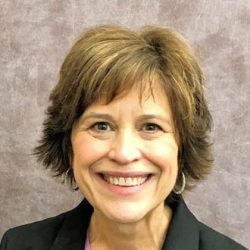
Tami DuFault-Toomb
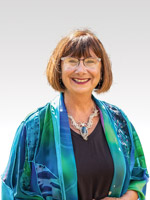
Carol Pelletier Radford
Carol received her Education Doctorate from the Harvard University Graduate School of Education, where she focused her studies on mentoring and teacher leadership. She is also a certified yoga teacher who practices meditation and shares mindfulness strategies with educators through her online courses and website. Her podcast Teaching With Light features the stories of teachers and inspirational leaders. Her next passion project is the creation of a Teacher Legacy Network, where retired teachers can share their wisdom with the next generation of teachers.
You can learn more about Carol, find free resources, videos, meditations, courses, and all of her books at mentoringinaction.com/.
Twitter: @MentorinAction
Facebook: @MentoringinAction4Teachers
Instagram: @cpradford
Related Titles
This is a carousel with related book cards. Use the previous and next buttons to navigate.
